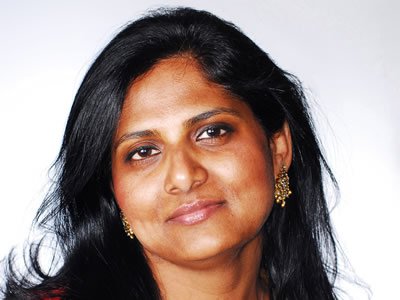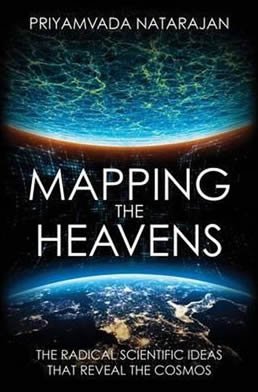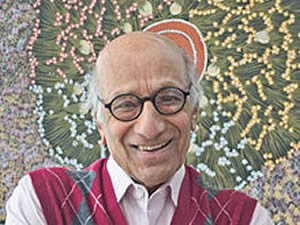Yale Physicist to Deliver 10th Annual Wali Lecture Oct. 26
Priyamvada Natarajan will mark Wali's 90th birthday with interdisciplinary program about expanding universe

The College of Arts and Sciences (A&S) will celebrate the 10th anniversary of one of its premier lecture series with a program by a renowned theoretical astrophysicist.
Priyamvada Natarajan, professor of astronomy and physics at Yale University, will deliver this year’s Kameshwar C. Wali Lecture in the Sciences and Humanities in A&S. Her presentation, “Mapping the Heavens: How Radical Ideas Have Transformed Our Cosmic View,” will be on Thursday, Oct. 26, at 4 p.m. in Shemin Auditorium in the Shaffer Art Building.
The lecture is free and open to the public, and coincides with Wali’s 90th birthday. For more information, contact the Department of Physics at 315.443.3901.
An A&S faculty member since 1969, Wali is a professor emeritus in the Department of Physics.
“The Wali Lecture series has evolved into one of the University’s signature events,” says organizer Simon Catterall, professor and associate chair of physics. “Priyamvada Natarajan embodies our commitment to interdisciplinary teaching, research and scholarship. That her visit comes on the heels of our discovery of colliding neutron stars gives it added significance."

At Syracuse, Natarajan will draw from her best-selling book, “Mapping the Heavens: Radical Scientific Ideas That Reveal the Cosmos” (Yale University Press, 2016). As one who literally creates maps of invisible matter, she will explain how the universe, once thought to be a stagnant place, is expanding at an accelerating rate.
Propelling this expansion, Natarajan says, is an anti-gravity force called dark energy, comprising two-thirds of the known universe. The rest of the cosmos is made of dark matter, an invisible, nonluminous substance that holds galaxies together, and a smattering of ordinary matter—protons, neutrons and electrons found within atoms.
Natarajan will address these and other cosmological puzzles, including the formation and growth of black holes, dark matter holes, the echo of the Big Bang (originating 13.9 billion years ago), the discovery of exoplanets and the possibility of other universes.
“The acceptance of new ideas about the universe and our place in it has never been linear and always has been contested, even within the scientific community,” says Natarajan, who specializes in cosmology, gravitational lensing and black hole physics. “As shifting and incomplete science always must be, it offers the best path we have toward making sense of our wondrous, mysterious universe.”
Wali is excited to host Natarajan, praising her book as a major piece of scholarship—a “greatest hits” collection of cosmological discoveries. “It is a wonderful book, and she’s a very good speaker,” says Wali, a former Joel Dorman Steele Professor, known for his research into the symmetry properties of fundamental particles. “Hers should be an excellent talk.”
Natarajan has written extensively on dark matter and the formation and growth of black holes. By examining the deflection of light rays by matter (i.e., lensing), she is able to map the distribution of dark matter, whose gravitational pull forms a kind of cosmic scaffolding.
The Indian-born physicist also studies the growth history of black holes in cosmic time, and the formation of first-seed black holes whose mass is more than 100,000 times that of the sun.
“Dr. Natarajan works on models about the formation of massive black holes, direct-collapse black holes and their observational signatures,” Catterall says. “Her grasp of radical ideas and discoveries, coupled with a gift for distilling them into something understandable, makes her a [science] popularizer of the highest order.”
Indeed, Natarajan’s research has graced some of the world’s leading news outlets—from The Wall Street Journal and The New Yorker; to National Public Radio, PBS and the BBC; to Scientific American, Discover and National Geographic magazines. Her writing regularly appears in the Washington Post, the Huffington Post and The New York Review of Books, as well as on CNN.com.
Natarajan also is the recipient of many honors and awards, including Guggenheim and Radcliffe fellowships, the Sophie and Tycho Brahe Professorship in the University of Copenhagen’s Dark Cosmology Center and an honorary professorship for life at the University of Dehli. She is the incoming chair of the Division of Astrophysics of the American Physical Society (APS), of which she is a fellow.
Following interdisciplinary work at M.I.T., Natarajan earned a Ph.D. from the University of Cambridge (U.K.), where she was the first woman in astrophysics to be elected a Trinity College Fellow. This led to a postdoctoral fellowship at the Canadian Institute for Theoretical Astrophysics in Toronto and then a faculty appointment at Yale.
“Aside from her research, she is deeply invested in the public dissemination of science,” Catterall says, “specifically in illuminating to the curious public how the scientific process works via the history of ideas.”
Co-sponsored by the Department of Physics and the Syracuse University Humanities Center in A&S, the Wali Lecture has evolved into a popular fall tradition on campus. Past speakers have included evolutionist Lynn Margulis, naturalist Diane Ackerman, journalist George Packer, physicist Mark Trodden and neurobiologist Carla Shatz.
“The Humanities Center is proud to be a longtime supporter of the Wali Lecture series,” says Vivian May, director of the Humanities Center and professor of women’s and gender studies in A&S. "In addition to her scholarly contributions as a theoretical astrophysicist, Dr. Natarajan has a keen ability for sharing abstract discoveries with wider publics. She also is a tireless advocate for justice in the Academy, especially where issues of parity and equality for women in the sciences are concerned.”

This is not the first time Wali has organized lectures on campus. Using seed money from then-Chancellor Melvin A. Eggers, he launched an interdisciplinary lecture series in 1976 that ran for more than a decade. “The funding eventually ran out,” admits Wali, author of the critically acclaimed “Cremona Violins: A Physicist’s Quest for the Secrets of the Stradivari” (World Scientific, 2010) and “Chandra: A Biography of S. Chandrasekhar” (The University of Chicago Press, 1991). “A few years later, I helped put together the University Lecture Series, which has continued to this day.”
During the mid-2000s, Cathryn Newton, then dean of A&S, worked with Wali’s three daughters—Alaka, Achala and Monona—to establish a named lecture series in his honor. From the onset, the series has served as an expression of the trio’s admiration and gratitude for their father’s “vision, leadership and dedication to the University and the greater community.”
“We’ve been influenced by Dad’s love of science, literature, politics and philosophy. He and my mother would engage us with lively debates about all manner of things,” says Alaka Wali, a curator of North American anthropology at the Field Museum in Chicago. “We thought a named series would be appropriate, since it reflected his embrace of the breadth of human creativity.”
Working with a team of people who included Cristina Marchetti and Deborah Pellow (professors of physics and anthropology, respectively), the series roared out of the gate with a lecture by Margulis, a world-renowned evolutionary biologist and a family friend. She died in 2011.
“Lynn exemplified the best of science and the humanities,” Alaka says.
Today, Wali and his lecture series remain intellectually vibrant and engaged. “Scientific research is at an intellectual crossroads,” says Wali, a fellow of the APS, who has held faculty appointments at Harvard and Northwestern universities; The University of Chicago; and at institutions in France, Italy and Israel. “It is imperative for scientists and humanists to work together, to understand one another, for the betterment of society. Our future depends on it.”
